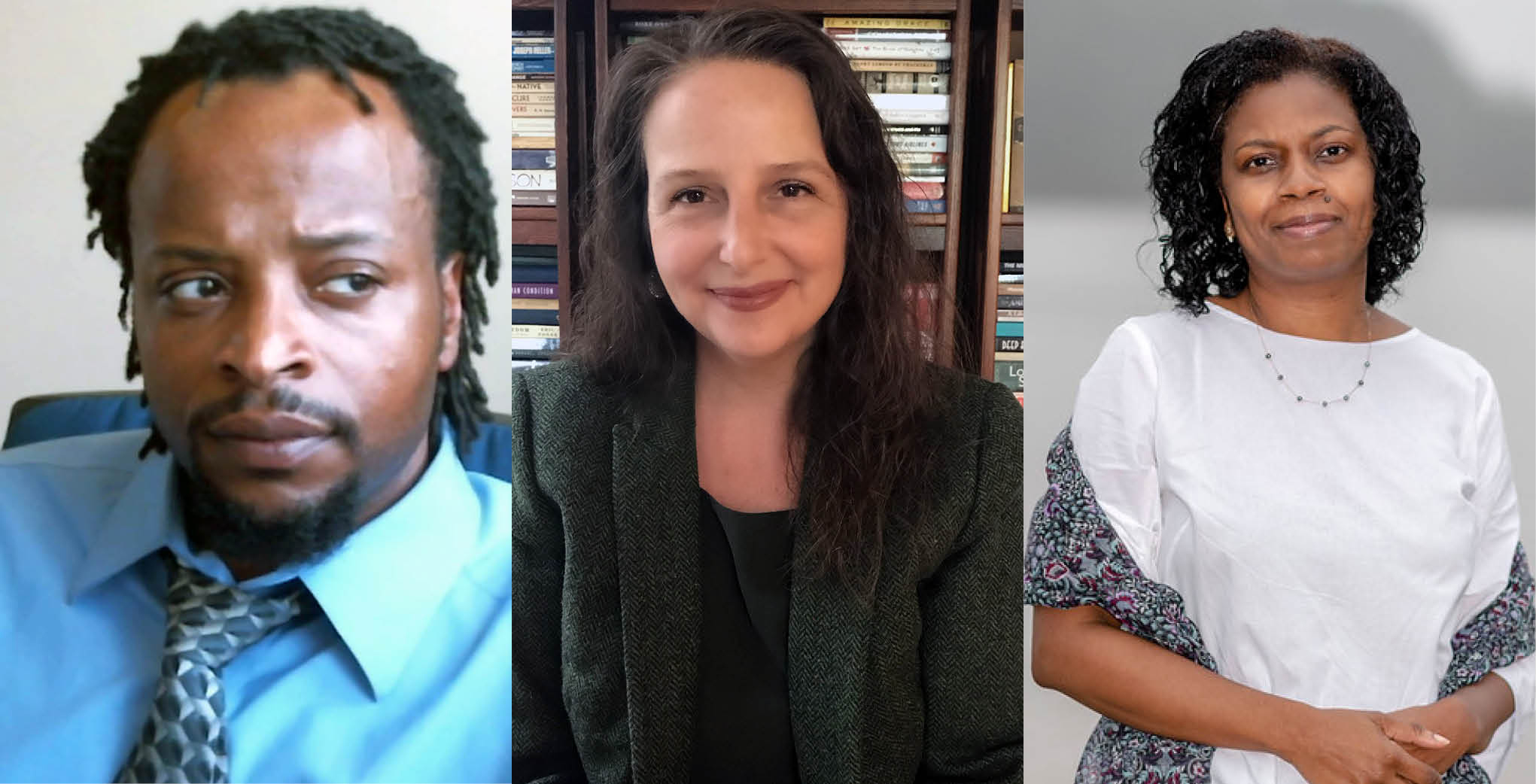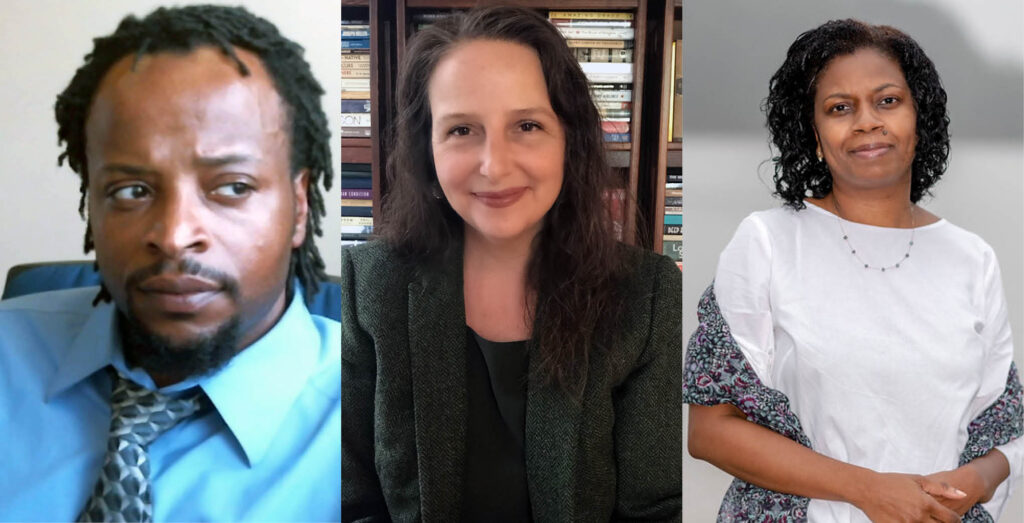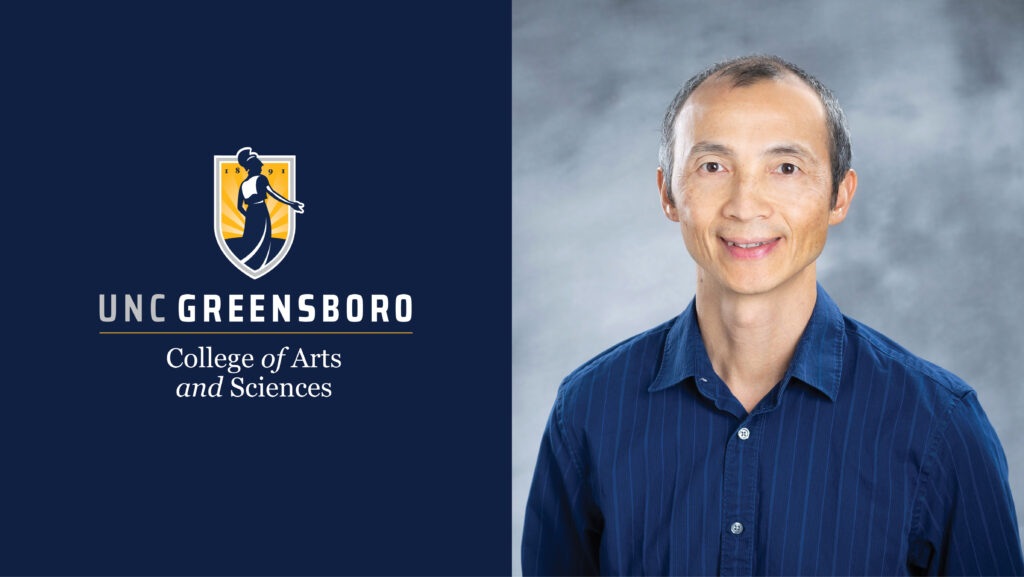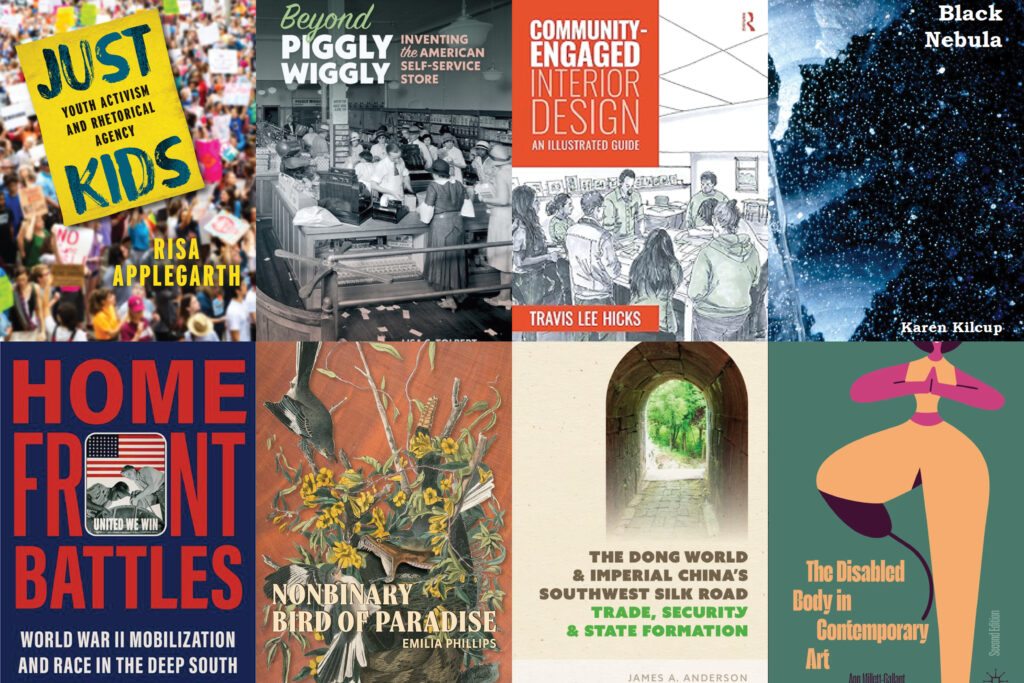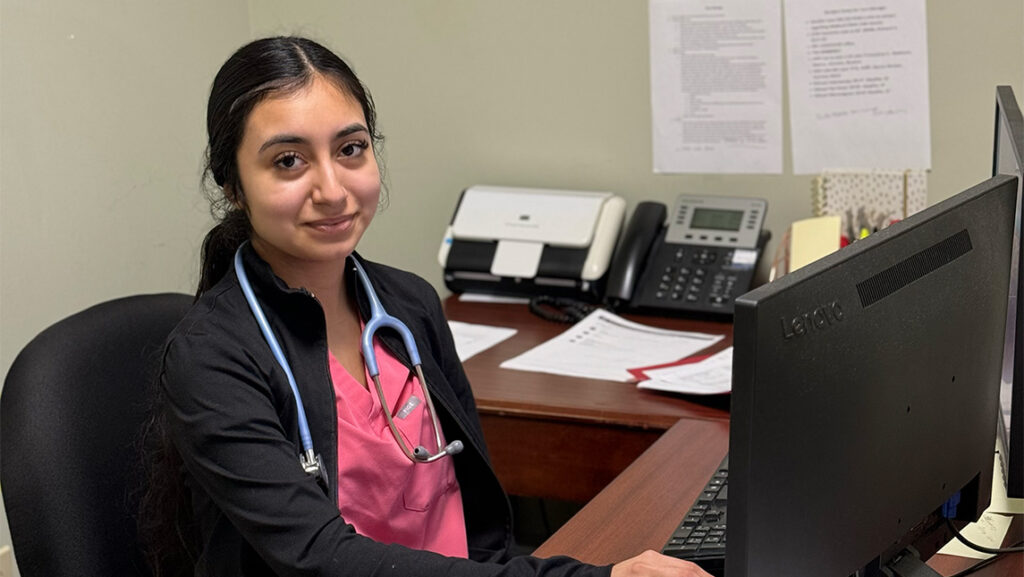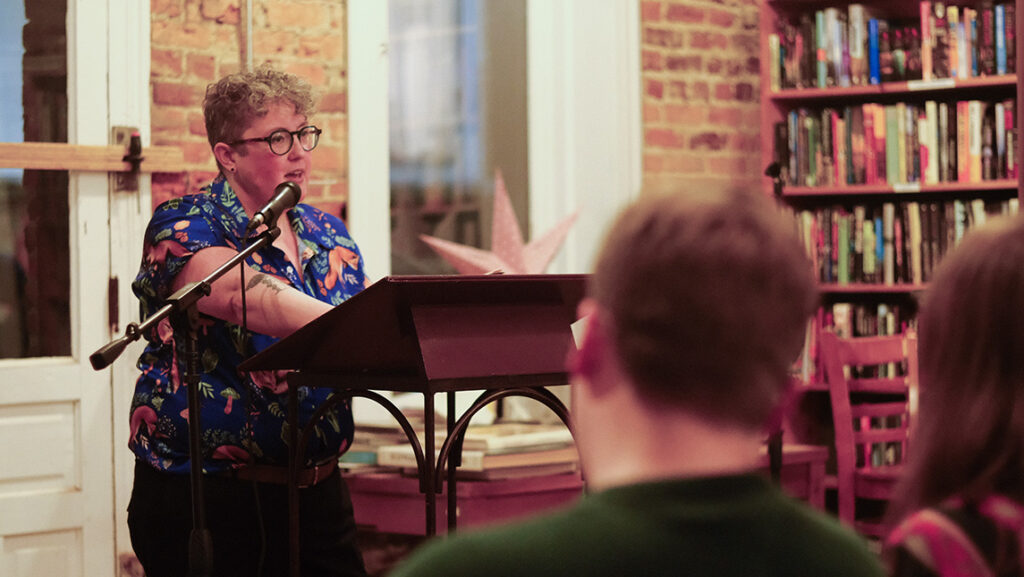By now the names George Floyd, Breonna Taylor, and Ahmaud Arbery have been spoken, chanted, and reprinted countless times after their deaths ignited protests and debate across the globe. Many universities have also been quick to state their outrage over these deaths—and commitment to students, faculty, and staff of color—including UNC Greensboro’s Chancellor Gilliam.
One program that is well versed in engaging productive discussions on issues of race, cultures, and sociopolitical movements is UNCG’s African American and African Diaspora Studies (AADS). The AADS program, according to director Dr. Noelle Morrissette, “offers a range of courses about African diasporic peoples, experiences, and cultures. These diverse offerings engage traditional disciplines such as literature, history, sociology, and political science and include ‘Africana Literatures,’ ‘Understanding Race,’ and the popular ‘Introduction to Black Studies’ and ‘Blacks in America.'”
Here, Morrissette and two other professors of African American and African Diaspora Studies share their scholarly and personal perspectives.
Dr. Armondo Collins

“I know firsthand the policing that George Floyd was subjected to.”
Dr. Armondo Collins is a professor of African American and African Diaspora Studies and heads the Digital Media Commons in Jackson Library. Here, he talks about growing up in Minnesota, where George Floyd died after a Minneapolis police officer kneeled on his neck.
“From ages 13 to 25, I thought it was normal for police officers to drive up on the curb with cars, to cut you off as you walk, to ask you where you were going. I thought it was a given that officers would draw their guns out on you during routine traffic stops.”
[expand title=”Read the Q&A”]
What is the focus of your research and teaching?
My research focus is African American literature with intense attention given to Black Nationalism, Religious rhetorics, and narratives of Black masculinity and identity. I have been at UNCG for 10 years. I have taught in the AADS program for five years. I teach ADS 201: Introduction to Black Studies and ADS 210: Black in American Society. I am also the department head of the Digital Media Commons in Jackson Library where I teach digital literacy.
As someone who studies and teaches about the diversity of Black cultures, history, art and sociopolitical movements, what are your thoughts on the protests ignited by the death of George Floyd?
The George Floyd protests are pivotal, I think, in how they inflect a national ethos that acknowledges a common danger shared by all living under militarized police rule. The protests will be remembered in history as a catalyst for more far-sweeping social liberalism and political reform.
I worry, however, that the catalytic nature of our particular moment will skew the facts attending to the case proper and distort its unique place in the history of state-sanctioned violence against African America specifically since the nation was founded. Black people have been killed dead and alive by the system of white supremacy that most American police agencies represent for centuries. Police reform is one of the many systemic changes this society will have to grapple with in order to overcome America’s legacy of slavery and racism.
What does this movement bring up for you from a personal perspective?
I was born in St. Paul, MN. I lived there until I was 20. I know firsthand the policing that George Floyd was subjected to. It was a part of everyday life as a Black person in Minnesota. Over-policing and surveillance. It isn’t just the Minneapolis police department; it is white society in Minnesota as a whole that over-polices and surveils Black life and Black bodies.
From ages 13 to 25, I thought it was normal for police officers to drive up on the curb with cars, to cut you off as you walk, to ask you where you were going. I thought it was a given that officers would draw their guns out on you during routine traffic stops. I thought all white people were naturally scared of Black people, and although annoying, were expected to ask you if you live or belong in the space you were occupying. None of that is normal. And none of it is justified. And none of it will bring about social equilibrium if we allow it to continue. Racism is pathological, and unsustainable as a social-economic-political growth model.
In your experience, what are productive ways to teach and talk about race and bias?
I talk about race and racism as functional components of America as a system of white supremacy designed to evolve and self-perpetuate in maintenance of itself. Race and racism, though very personal in their manifestations, are at their core vital aspects of a system of living predicated on violent inequality and served by racism’s continued existence as a social force holding sway over the progress of society as a present and future reality.
What do you hope or anticipate will happen as a result of the current unrest?
I anticipate America’s system of white supremacy will coopt and commodify this latest wave of humanist insurgency in favor of its own materialistic greed and cultural conservatism.
How, if at all, do you think current events will affect your research and/or teaching moving forward?
It will further my research into Black nationalist religions and rhetorics, and my research into the rhetorics of Black masculinity and the over-policing of Black bodies.
Is there anything else you’d like to share?
“F12” is a discourse utterance that lives on the same spectrum as the original phrasing of the term “Back Lives Matter.” It is an in-group communication from the oppressed to the oppressed about their shared oppression.
[/expand]
Dr. Noelle Morrissette

“I think first about George Floyd as a man who lived, had a mother, a father, a family, friends…”
Dr. Noelle Morrissette is director of UNCG’s African American and African Diaspora Studies (AADS) and an associate professor of African American Literature. Here she talks about the AADS program, shares her own scholarly perspective, and recommends useful readings.
“I think first about George Floyd as a man who lived, had a mother, a father, a family, friends, and a community to which he belonged. He was loved. I find this no different from Emmett Till and countless other African Americans whose lives were brutally ended. While there is often the inclination to turn their lives into symbols, they were humans first. By turning the focus to their humanity we can more easily see that their fate could befall any person who is raced.”
[expand title=”Read the Q&A”]
What is the focus of your research and teaching?
I currently serve as Director of African American and African Diaspora Studies. I am also an associate professor of African American literature specializing in twentieth-century authors, and I am trained in the entirety of the African American literary tradition, from the eighteenth century to the present. My books so far have discussed the early 20th century Civil Rights activist and author James Weldon Johnson (1871-1938). I teach American literature survey courses, special topics courses on African American and American literature, advanced seminars on twentieth and twenty-first-century African American literature, and graduate seminars in African American literary history and theory.
As someone who studies and teaches about the diversity of Black cultures, history, art and sociopolitical movements, what are your thoughts on the protests ignited by the death of George Floyd?
I think first about George Floyd as a man who lived, had a mother, a father, a family, friends, and a community to which he belonged. He was loved. I find this no different from Emmett Till and countless other African Americans whose lives were brutally ended. While there is often the inclination to turn their lives into symbols, they were humans first. By turning the focus to their humanity we can more easily see that their fate could befall any person who is raced.
It is sometimes difficult to see the experience of someone whose life is different from our own. But these protests underscore that many recognize our shared fate and possess the will to recognize inequality and advance a better practice of democracy. I deeply affirm this will in our students.
What does this movement bring up for you from a personal perspective?
Like Chancellor Gilliam, I too have had “the talk” with my son. I am a white woman, not a black man. But, in reading and studying and moving beyond my experience, I too see the crucial nature of discussing inequality. It is not an abstract concept, and what is at stake is our shared humanity.
In your experience, what are productive ways to teach and talk about race and bias?
I think the first thing to note that race does not equal blackness, although the term is often used in this way. There are excellent scholarly studies of the formation of whiteness in the American nation, from the Immigration Exclusion Act of 1791 forward, that can help us understand that the term “race” applies to us all. Of course, race as a black-versus-white formation was and continues to be the deepest dividing line in this nation. (The “one-drop rule” distinguishing black ancestry from white was spectacularly confirmed in the case of Plessy vs. Ferguson, where Homer Plessy, a man by all appearances white, sued for equal access to the whites-only train car in order to contest segregation; the Supreme Court responded by making official what was already the “custom” of de jure Jim Crow.)
In my classes, I provide some of this historical context, and we get at these ideas and this history through culture and literature—that is, through specific texts, authors, and genres. What we find is that these authors use their art to renegotiate, confront, and create circumstances for beauty and for conversation between groups. We recognize that there are diverse perspectives and many voices within the African-descended community and points of connection between Americans. What’s significant is that these authors do not turn away from, but rather turn towards, issues of crisis and inhumanity, to voice the ways in which our nation has addressed, or failed to address, its democratic principles across lines of race, class, and gender.
What do you hope or anticipate will happen as a result of the current unrest?
This is a continued conversation, one that predates the history of our nation.
How, if at all, do you think current events will affect your research and/or teaching moving forward?
We cannot help but be shaped by events such as these. The many lives that have been lost as a result of violence against African-descended people, women and men and children, must be held in our present consciousness. At the same time, while many are inclined to think of these as current events, we ought to read more broadly to understand the long and persistent history of this violence in the nation. Reading literary works, we see the humanity of their authors, who are not victims. James Weldon Johnson asserted in 1922 that the nation should view African Americans as creators and citizens. We ought to read his words and ponder their significance now, amidst our 21st century context, almost 100 years later.
Is there anything else you’d like to share?
Recommended reading:
- Chancellor Gilliam’s statement
- James Weldon Johnson, “The Autobiography of an Ex-Colored Man” (novel)
- Claudia Rankin, “Citizen” (poetry)
- Ta-Nehesi Coates, “Between the World and Me” (memoir)
- Richard Wright, “The Ethics of Living Jim Crow” (essay)
- Emily Bernard, “Black is the Body: Stories from my Grandmother’s Time, My Mother’s Time, and Mine” (memoir)
- Ibram X. Kendi, “How to be an Antiracist”
- Matthew Frye Jacobson, “Whiteness of a Different Color”
- Nancy Isenberg, “White Trash: The 400 Year Untold Story of Class in America”
[/expand]
Dr. Tara T. Green

“This is about how systems have not recognized the humanity of people who are perceived as Black.”
Dr. Tara T. Green is a professor of African American and African Diaspora Studies (AADS) at UNCG, where she taught the first Black Lives Matters course in the country, one she’ll be teaching again this fall. Here, she talks about her work and what she hopes will come about from the current unrest.
“I am mindful of stories shared with me by Black students in class, relatives, and friends who have had interactions with the police. I am of the Rodney King era, which was my awakening to such interactions. But this is about more than those interactions; it is about systems of power and how those systems have not recognized the humanity of people who are perceived as Black and/or how those systems have denied us equal access to what the system has sworn to provide.”
[expand title=”Read the Q&A”]
What is the focus of your research and teaching?
I came to UNCG in the fall of 2008 to become director of what was then the African American Studies program. I was director until spring of 2016. My areas of specialty are Black activism and Black feminism/Black women’s studies. I am scheduled to teach a Black Lives Matter course for the third time in the fall. I also teach African American and African fiction, poetry, and autobiography.
As someone who studies and teaches about the diversity of Black cultures, history, art, and sociopolitical movements, what are your thoughts on the protests ignited by the death of George Floyd?
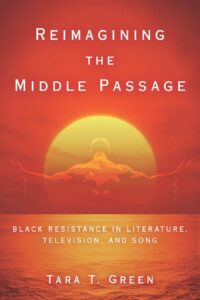
My book, “Reimagining the Middle Passage: Black Resistance in Literature, Television, and Song” (published in 2018), provides an overview of the historical connection between the transatlantic slave trade and violent mistreatment of Black folks at specific times, such as Hurricane Katrina. I look at how Black artists respond to racism upheld by local and national governments.
I have also published a book called “From the Plantation to the Prison: African American Confinement Literature,” which deals with imprisonment from the perspective of Black writers. My work speaks of my thoughts.
For more information, visit http://www.drtaratgreen.com/
What does this movement bring up for you from a personal perspective?
I would not prefer to discuss my personal experiences with racism, but I am mindful of stories shared with me by Black students in class, relatives, and friends who have had interactions with the police. I am of the Rodney King era, which was my awakening to such interactions. But this is about more than those interactions; it is about systems of power and how those systems have not recognized the humanity of people who are perceived as Black and/or how those systems have denied us equal access to what the system has sworn to provide.
It matters what we assign and how we approach those conversations. It also matters who is teaching. I was trained to teach about the lives and experiences of African Americans, and I continue to learn from my peers in African American Studies and to read and reread important work. Training is important.
What do you hope or anticipate will happen as a result of the current unrest?
My hope is that people in positions of power (regardless of race) will work with knowledgeable people of color (who are not conspirators) to assess how and where they are advancing racism and then do the work to dismantle harmful systems and build inclusive ones.
How, if at all, do you think current events will affect your research and/or teaching moving forward?
I will continue to do what I am doing in my writing and teaching. I have been in the process of revising my syllabus to include writings on incarceration and BLM activist writers and will continue that work.
[/expand]
Story by Elizabeth Keri, College of Arts & Sciences
Photo of Tara Green by Martin W. Kane
Other photos courtesy of the subjects
